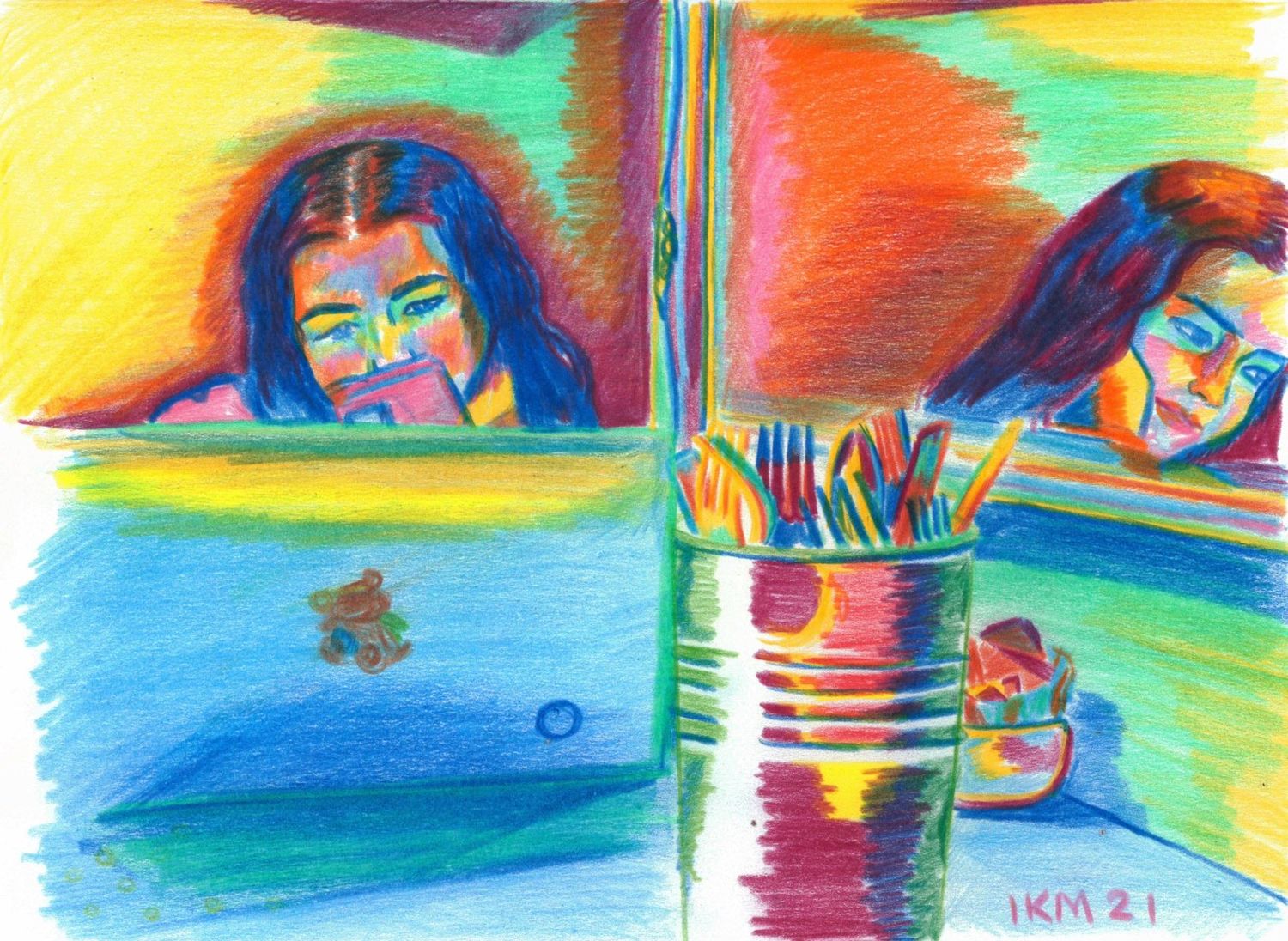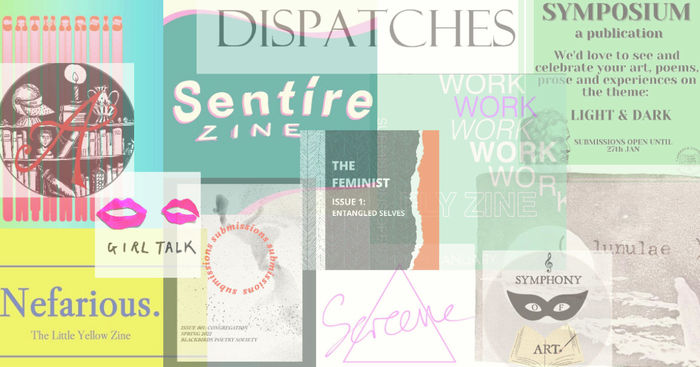bell hooks beautifully encapsulated the connection between queerness and creativity when she described “queer as being about the self that is at odds with everything around it and has to invent and create and find a place to speak, to thrive and to live”. Screeve, Cambridge’s first specifically queer creative platform was founded this Michaelmas by a group of undergrads with the aim of providing precisely such a place for LGBTQ self-expression in any form. I sit down with three of its founders, Bob Hewis, Isabella Woolston, and Miruna Tiberiu, to discuss the creative vision behind the platform, their first virtual zine, and Screeve’s exciting plans for the term ahead.
It’s astounding that it’s taken so long for a specifically queer creative space to emerge at a university with such a vibrant and varied arts scene. The founders felt compelled to redress this shocking absence because, although there is no shortage of zines for queer students to submit to, “there are some aspects of their identity that maybe wouldn’t be understood by a non-queer panel.” In contrast, Screeve’s all-queer committee “can be open to those experiences”. Bob explains that an alternate space is also essential “because the link between queerness and creativity is often exploited in non-queer spaces”. All too often in the mainstream, he thinks, “we’re appreciated for the fun things we do – like that we’re amazing at creativity and design, but there’s other aspects of what we are that are not so accepted in the mainstream.”
“Unusually, the zine emphasises the process of creation as much as the art itself”
The founders hope to foster the queer community they wished they’d encountered as freshers trying to “find their people”. Bob points out that both in Cambridge and on a national level, “most spaces for LGBT people are clubs; those are the only moments that people specifically come together” and “that’s not for everyone”. Coronavirus was a huge catalyst for Screeve’s creation. Lockdowns “smashed apart queer networks of communication”, with many underground queer venues forced to shut down. “I was very much thinking about now as a moment of coming back together through creativity that brought us all together in the first place; that was my thinking of healing.” From the outset, the collective has focused heavily on physical events to foster human connections, and this Lent is no different. First up, a Re:Launch event at the vegan café Thrive, and then, a Writing in the Dark workshop in collaboration with the Blackbirds poetry society. During the second half of the term, they plan to host weekly writing workshops.
Screeve aims to spotlight far more than just the written word, however. The founders are acutely aware that self-expression can take a plethora of forms and that’s why they chose to create a multi-media platform. Miruna says “I want us to have as much of a social media presence, an online presence, as the physical zine.” They wanted, above all, to avoid being prescriptive, because as Bob explains: “writing is not how everybody thinks through their experience.” Screeve’s dedication to inclusivity also manifests itself in its non-selective attitude. The editors are determined that everything they receive will be show-cased. According to Bob, “if it’s not in the physical zine, either it will be on our social media or we’re hoping to host open mic nights so people can come speak aloud their pieces or of course, with photography or film we’ll show it somewhere.” This is due to their strong conviction that “no one can be a judge of the quality of your art because art is so subjective.”
Healing was the theme of the first edition of the zine, which is available to view virtually on Screeve’s Instagram and Twitter pages. Each ‘page’ of the zine is stunningly intimate. Iz Maxwell’s beautiful portraits in vibrant coloured pencil exude a calm, healing warmth and Renée Eshel’s playfully weird and visceral poems are gloriously evocative. Easter Term by Iz Maxwell was a particular highlight for the editors. They are visibly delighted by the power of the poem’s details to conjure up their own memories of Cambridge. Catz students Isabella and Miruna exclaim ‘The Catzebo!’, gleefully remembering Maxwell’s mention of a familiar landmark. The subject which recurs most in the works is romantic relationships. Bob attributes this to the lack of nuanced mainstream representations of queer love. In queer coming-of-age relationships, he thinks that, “often you feel like you’re paving the way yourself and you don’t have the same points of reference that other people have, so there’s a lot more baggage that you think through for yourself.” The products of these ruminations moved him: “it was really beautiful what came through.”
“To be queer is to realise that you can invent yourself and that you can create yourself and often a way to channel that is through creative projects”
Unusually, the zine emphasises the process of creation as much as the art itself. Each artist produces a page of detailed creator’s notes. The team wanted to foreground “that the process of creating is a form of healing”. The process of artistic creation is, to them, an essential outlet for working through the complexities of (and all too often the traumas produced by) growing up queer in a heteronormative world. The zine also reveals creation as healing on a more general level. In her creator’s note, Iz Maxwell explains that she began to paint and draw as a way of coping with bouts of severe insomnia. None of the works have titles, but at the bottom of one of her pages, Maxwell writes simply “You can make something good.” The team adored this, and to Bob it has become something of a mantra about healing (and life in general). “I really loved it because it could mean you can make something good as in you can make a good piece of art, but I also loved the idea that you can make something good as in, you can make any situation good.”
Submissions are now open for this term’s edition, which will (for now) remain virtual. The new theme is Re:invention, which has a double signification, both literally denoting reinvention and abbreviating ‘regarding invention’. Isabella says it felt like a natural choice because “reinvention and healing are two steps of the same process.” She adds that “to be queer is to realise that you can invent yourself and that you can create yourself and often a way to channel that is through creative projects.” The title was particularly inspired by perhaps the most quintessentially queer mode of creative reinvention: drag. Its inception, fittingly, also coincided with Screeve’s own reinvention, as the team reorganised their roles into a non-hierarchical structure.
Screeve also has a podcast, Cackle; its first two episodes are available to stream or download on Screeve’s social media. Co-host Isabella describes Cackle as the zine’s “little sibling”. She sees it as “a dialogue”, which hopefully will “create more of a community around Screeve”. Cackle is warm, joyful, and often very funny. Isabella and her co-host Josh Osman flit from topic to topic, discussing queer history, reading poetry aloud, and enthusing about drag and their favourite singer-songwriters. Isabella felt a podcast was necessary because “sometimes talking is the best way to digest certain topics.” She adds that “it also allows for more scope because, for example, poetry is meant to be read aloud in some cases.” After listening, I’m left with no doubt that the wit and wisdom of Isabella and Josh will provide the comfort and guidance of “big siblings” to many queer students finding their feet in Cambridge.
“I think maybe people forget that Britain has a super long queer history, like the first pride was in London, so there’s lots that we need to remember”
The unique name Screeve means ‘to write’, and ‘writing’ in Polari, an underground slang developed by gay British men in the 18th and 19th centuries. As a history student, Bob wanted to “tap back into the past” to reflect on “where we’ve come from and what we can learn from it”. It was especially important to him to “specifically connect the zine and the community to British queer heritage” because he is understandably frustrated at how frequently contemporary culture reduces the LGBT+ community’s past to a US-centric narrative. “I think maybe people forget that Britain has a super long queer history, like the first pride was in London, so there’s lots that we need to remember.”
The platform’s logo is also firmly rooted in queer history. It’s a right-side up pink triangle, a symbol so important to Bob that he wears a badge of it on his lanyard each day. The triangle originated as the symbol of Silence = Death, a protest movement during the AIDs crisis. Bob prefers it as a symbol to the more ubiquitous (and corporately co-opted) Pride Flag because “it’s more challenging and more uncomfortable and a lot of queer history is uncomfortable and should be challenging.” It’s also an extremely powerful example of healing. “It’s a subversion of the upside down pink triangle that gay men had to wear in concentration camps in the 1940s; it’s about turning a symbol of oppression upon its head into a symbol of liberation.”
The founders of Screeve know that queerness has always been inextricably connected to creativity, serving both as a source of inspiration and a coping mechanism. Thanks to them, our university’s queer community finally has specific spaces, both virtual and physical, to continue this deep-rooted tradition of self-expression. It’s about time, and all of us, queer or straight, have lots of beautiful creations to look forward to as a result.
Submissions are now open for Screeve’s second edition, Re:Invention. They should be sent to screevecam@gmail.com.
Instagram page: https://www.instagram.com/screevecam/
Twitter page: https://twitter.com/screevecam
Cackle Podcast can be accessed via Screeve’s twitter and Instagram.
Screeve will host their Re:Launch event on Saturday 5th February at 8pm at Thrive Café and Bistro. Blackbirds Poetry Society X Screeve Writing in the Dark workshop will be held on Thursday 17 Feb at 8pm in the Blue Boar Room, Trinity College. Writing workshops’ location and time TBC but will most likely be held on Saturdays and begin in Week 4.
Illustration kindly provided by Iz Maxwell, whose work can be found on her Instagram page: https://www.instagram.com/d.iz.igns/


